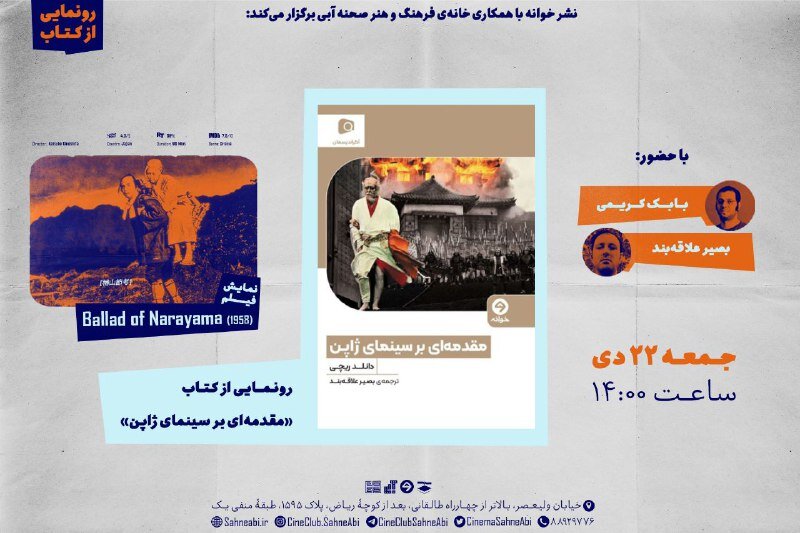Book on Japanese cinema to be unveiled in Tehran

TEHRAN- The Persian translation of “Japanese Cinema: An Introduction” by American author Donald Richie is planned to be unveiled during a ceremony at Tehran’s Sahne-ye Abi Theater on Friday.
The Persian edition of the book, translated by Basir Alaqeband and published by Khaneh Publications, provides a study of the distinct attributes that characterize Japanese cinema.
“Japanese Cinema: An Introduction” serves as an invaluable resource for film appreciation students and those interested in Japanese culture.
The introduction of the Persian edition of the book states: "Japanese cinema has always attracted a diverse and enthusiastic audience from around the world, but the richness and complexity of Japanese tradition and culture often pose challenges and misunderstandings for foreign viewers."
"This concise introduction offers a brief history of Japanese cinema while exploring its cultural foundations, demonstrating how the influence of foreign elements has transformed it into a fusion of native and international components, ultimately creating a unique cinematic identity."
The late Donald Richie, an American-born filmmaker, critic, and acclaimed writer, introduced Japanese cinema to Western audiences through his works such as “A Hundred Years of Japanese Film”, “Ozu: His Life and Films”, “A Tractate on Japanese Aesthetics” and “Japanese Cinema: Film Style and National Character.”
The unveiling ceremony will also feature a screening of the renowned film "The Ballad of Narayama" directed by Japanese filmmaker Shohei Imamura.
Following the screening, there will be a review session with the presence of Basir Aghaband, the translator of the book, and film critic Babak Karimi.
Produced in 1983, "The Ballad of Narayama" is set in a remote 19th-century Japanese mountain village. The storyline revolves around the ancient "ubasute" tradition, where elderly villagers are taken to desolate mountains to perish upon reaching the age of 70.
The film follows the journey of Orin, a strong-willed and resilient woman determined to fulfill her duty by ascending Narayama mountain. As she prepares for her inevitable fate, Orin navigates the complexities of village life and grapples with the moral dilemmas and conflicts inherent in this harsh ritual.
Imamura crafts a poignant and thought-provoking narrative, intertwined with elements of folklore and metaphor. The film delves into profound themes of life and death, sacrifice, and the human spirit's resilience in the face of adversity. Imamura skillfully captures the beauty and harshness of nature, juxtaposing the serene landscapes with the grim reality of village life.
"The Ballad of Narayama" is a visually stunning and emotionally evocative masterpiece, exploring the boundaries of social norms, cultural traditions, and the evolving nature of humanity. Imamura's portrayal of Orin and the struggles faced by the villagers leaves a lasting impact, forcing viewers to question their own perceptions of life, mortality, and the meaning of existence.
This timeless film showcases Imamura's unparalleled storytelling and visual prowess, earning critical acclaim and international recognition for its profound exploration of the human condition. "The Ballad of Narayama" is a cinematic tour de force that enthralls and challenges viewers, leaving a lasting impression on the depths of their souls.
SAB/
Leave a Comment